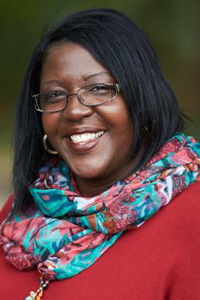Don't see what you're looking for?
Main Site
Berklee.eduCampuses and Schools

Kelly Davidson
Darcel Wilson
For media inquiries, please contact Media Relations
"I've done a lot of jingles in my career, and having been a student here at Berklee and understanding how ear training works, I use solfège to learn the jingles. Jingle houses don't really use written music anymore. You just have to go in and listen and learn the song by ear. So over the years I've used my ear training skills to write down whatever I can't memorize right away. I literally write, just over the lyrics to the jingle, the solfège, or the sol-fa. If it's really confusing to me, I'll write the rhythm that goes along with it. Just little personal notes—but ear training has allowed me to do that, so that I can work fast. And I really think that that has been a plus through my career. You get called back when you can work quickly."
"I'm very sensitive to drummers, because their instrument is not a harmonic one. But a lot of times with a little help we're able to find their singing voice. Some drummers, especially the first-semester ones, come in not realizing that their range goes beyond two or three notes. And so I'll spend time during my office hours and show them how to breathe and have them sing back some things so that they can understand how it feels to sing a higher note. I try to help them realize that you can hit the G above middle C. You don't realize it, but you can, because you just did—three times!"
"Bob Dylan is a non-singer. I don't mean that negatively. But because he doesn't have a sing-songy–type voice, all of his interpretation and his communication is through the way he speaks his words. And it catches on. I use that example with people that I teach because everybody's voice is different, and if Bob Dylan can get out there and sing his heart out, and people can respect it and appreciate it, I say go for what you want with what you have. Go for it."